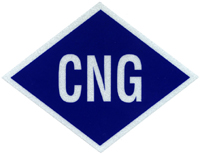
| Monday, July 02, 2012 | Archives | Advertise | Online Buyer's Guide | FLEETSolutions |
Crawford County, PA Joins Study Of Natural Gas For Use In Fleets
 Does it make sense to have vehicle fleets run on compressed natural gas rather than gasoline or diesel fuel? That’s a question a group of government entities and businesses in Pennsylvania are trying to answer since there is an abundance of natural gas available. Does it make sense to have vehicle fleets run on compressed natural gas rather than gasoline or diesel fuel? That’s a question a group of government entities and businesses in Pennsylvania are trying to answer since there is an abundance of natural gas available.Crawford County Board of Commissioners voted unanimously on June 21 to spend $1,500 to join in a feasibility study on the possibility of compressed natural gas as a fuel source. That study is expected to provide an answer by about August 1. "I think this is appropriate for us to see how this may impact our fueling and transportation," said Commissioner C. Sherman Allen, noting the county has about one hundred vehicles of all types in its fleet. Penncrest School District is spearheading the effort to look into the possibility. Other organizations involved in the study are Conneaut and Crawford Central school districts, Vantage Health Care Network, Universal Well Services Inc., Crawford Area Transportation Authority, Allegheny College, and National Fuel Gas. Wilson Engineering Services of Meadville currently is analyzing each organization’s fleet information such as vehicle type, age, miles driven, gallons of fuel purchased, operating profile, and overnight locations. The information will help each project partner decide whether or not to commit additional resources. Cost of this feasibility study is expected to be $10,000 to be shared among the project partners. Tim Geibel, Executive Director of Crawford Area Transportation Authority, said it may make sense for CATA, which has about thirty vehicles in its fleet. It operates fixed route bus service in Meadville and Titusville and shared-ride bus services throughout the county. "Right now, the gallon equivalent of CNG is less than fifty percent of the cost of a gallon of gas," Geibel said. "We’re looking at long-term savings." Geibel said it wouldn’t be feasible to retrofit or convert its fleet to CNG all at once, but possibly phase in CNG-powered vehicles over a multi-year period. "We need to know how many are out there and do we have enough volume (as a group)," Geibel said. While the current feasibility study is focusing on fleet analysis, further study would have to be done on such areas as vehicle technology, fueling location, the availability of fuel, and fast-fill or time-fill capabilities to refuel vehicles. |
 |
NAFA Fleet Management Association 125 Village Blvd., Suite 200 Princeton, NJ 08540 Telephone: 609.720.0882 Fax: 609.452.8004 |








